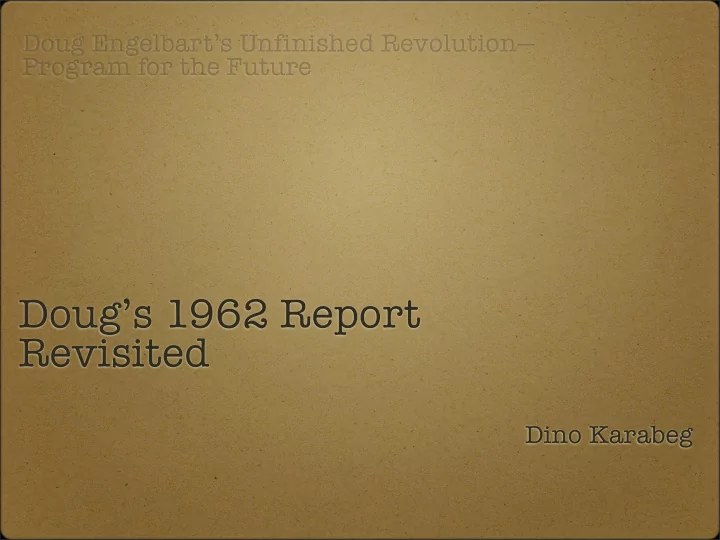

Doug Engelbart’s Unfinished Revolution— Program for the Future Doug’s 1962 Report Revisited Dino Karabeg
Doug Engelbart’s Unfinished Revolution— Program for the Future 1962 Report
Any possibility for improving the e ff ective utilization of the inte lm ectual power of society's problem solvers warrants the most serious consideration. This is because man's problem - solving capability represents possibly the most important resource possessed by a society. The other contenders for first importance are a lm critica lm y dependent for their development and use upon this resource. Any possibility for evolving an art or science that can couple directly and significantly to the continued development of that resource should warrant doubly serious consideration.
This kind of system approach to human inte lm ectual e ff ectiveness does not find a ready - made conceptual fs amework such as exists for established disciplines. Before a research program can be designed to pursue such an approach inte lm igently, so that practical benefits might be derived within a reasonable time while also producing results of long - range significance, a conceptual fs amework must be searched out — a fs amework that provides orientation as to the important factors of the system, the relationships among these factors, the types of change among the system factors that o ff er likely improvements in performance, and the sort of research goals and methodology that seem promising.
Principal elements of an augmentation system • Artifacts --physical objects designed to provide for human comfort, for the manipulation of things or materials, and for the manipulation of symbols. • Language --the way in which the individual parcels out the picture of his world into the concepts that his mind uses to model that world, and the symbols that he attaches to those concepts and uses in consciously manipulating the concepts ("thinking"). • Methodology --the methods, procedures, strategies, etc., with which an individual organizes his goal-centered (problem-solving) activity. • Training --the conditioning needed by the human being to bring his skills in using Means 1, 2, and 3 to the point where they are operationally effective
... there is no particular reason not to expect gains in personal inte lm ectual e ff ectiveness fs om a concerted system - oriented approach that compare to those made in personal geographic mobility since horseback and sailboat days.
In the years that followed, Doug’s focus shifted toward collective intelligence ...
Recommend
More recommend